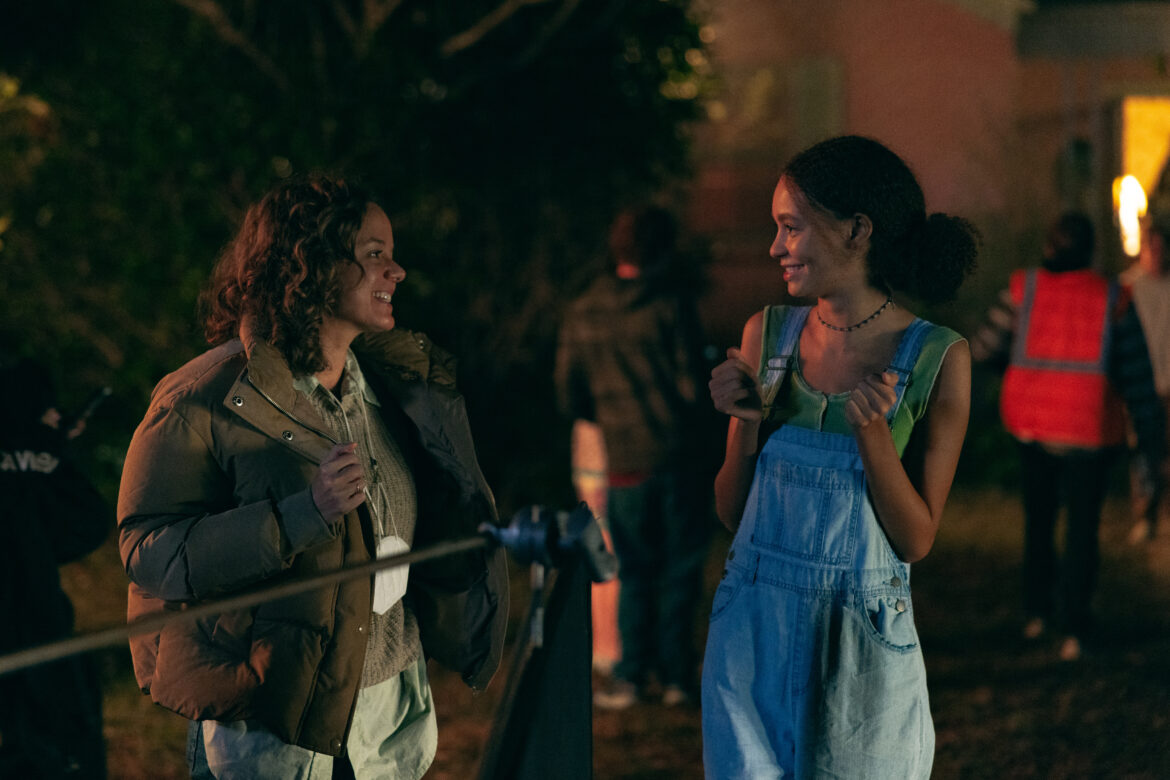By Kirsten Coachman
Being a teenager is hard.
It’s 2005, and Doris (Nico Parker, “The Last of Us”) is going through it. Her mom, Kristine (Laura Linney, “Ozark”), is moving her brother Max (Cree Kawa, “Signs of Love”) to hospice following a long time suffering from the effects of brain cancer. They arrive at the Suncoast facility in Florida to be greeted by swathes of protestors and police officers in light of patient Terri Schiavo’s story becoming mainstream news.
With a complex and emotionally heavy home life, Doris craves a bit of normalcy, even just getting to school on time. When Kristine decides to sleep at Suncoast until further notice to keep Max company, Doris offers up her house to her schoolmates so they can throw a party. But even with new friends and new experiences, she can’t fully escape the current hand of life that she’s been dealt. Or how Paul (Woody Harrelson, “Triangle of Sadness”), a protestor she unexpectedly befriended, lays it out for her: “You’re not normal, Doris.”
“Suncoast,” the debut feature film from Laura Chinn, is a moving coming-of-age story and multifaceted portrait of grief inspired by the filmmaker’s own personal life events during the mid-aughts.
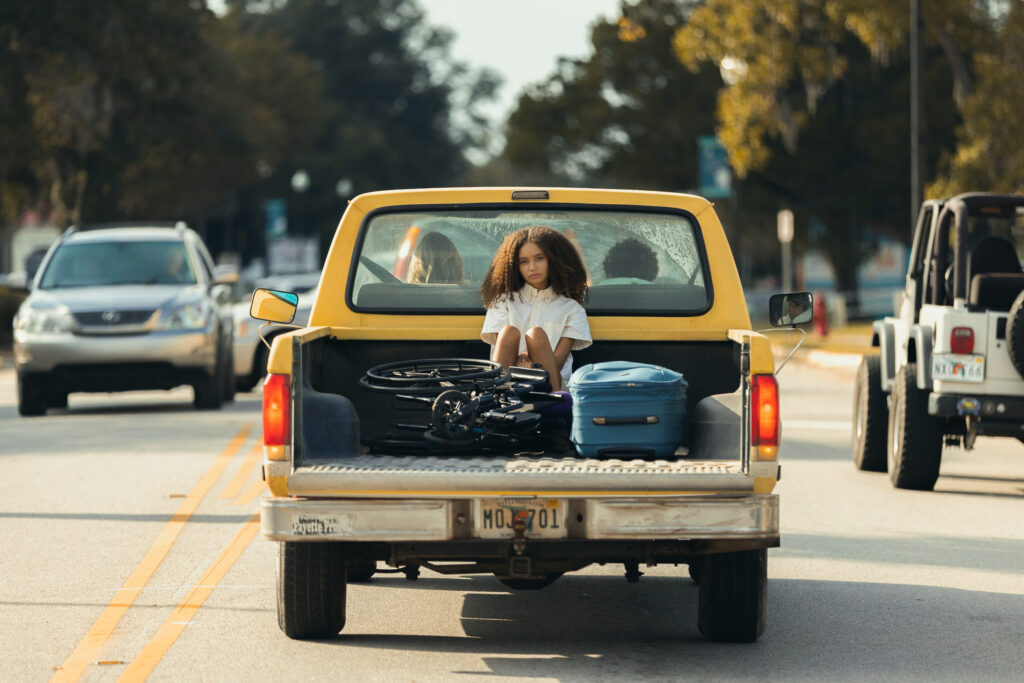
The film made its world premiere at the 2024 Sundance Film Festival last month. Parker was honored with the U.S. Dramatic Special Jury Award for Breakthrough Performance.
Previously, Chinn created and starred in the 2019 Pop TV series “Florida Girls.” Her writing credits also include “The Mick,” “Brad Neely’s Harg Nallin’ Sclopio Peepio,” and “Grandfathered.” She also can be seen in “Grey’s Anatomy,” “My Name is Earl,” and “Happy Endings.” Her first book, “Acne: A Memoir” was published in 2022.
Art U News sat down with Chinn earlier this week over Zoom to discuss the making of “Suncoast,” her “dream cast,” and the importance of continuing to learn and grow in your chosen craft.
First of all, congratulations on the film. I watched it last night, and it left me totally in tears. When did you know or start thinking that this was the story that you wanted to tell for your first feature film?
It was the story first. It wasn’t like I was like, “Oh, I wanna make this into a movie.” It really was just this is a story that I wanna write down. I move in really small baby steps, or else I can’t get out of bed in the morning. [Laughs.] So I start with just like, here’s a story I wanna write down and send to my managers. [Laughs.] And that’s all I know, you know? So it really was just this story, this idea, the fact that I was a teenager at hospice with Terri Schiavo is something that I’ve talked about with people since it happened 15 years [ago]. I hadn’t thought about how to write it down. Coming from TV and things always being so open-ended in a series, I hadn’t thought about how to write an open and closed story and into a feature film. So it was something I’d always wanted to tell. But when I finally had the space and time to do it, I really just wanted to do it just to tell the story, and then it sort of snowballed into where we are now, which is wonderful. [Laughs.]
One of the things that I really appreciated about this film was that it communicates that grief is not one-size-fits-all. You see it communicated through both Kristine and Doris, and being that the film is semi-autobiographical, what was your experience in directing the grief that Doris was living through and that Nico was acting out in the film?
You know, I think that Doris was very different than I was. I think Doris’s story, the details of it were so different that Nico and I were able to sort of create this character without ever having to say like, “Oh, that’s not how I would’ve felt.” So I think Doris’s grief, the way that she’s kind of detached and numb and not really confronting this thing that’s coming her way, that wasn’t my experience. I was just a drama queen, always feeling everything. So it was very different, but to me, like when you’re young, the thing I related to so much in Doris is the kind of selfish, narcissistic, like, I just want to be a teenager. I just want to be young. So that was something that, you know, every teenager can relate to. And, Nico too, even though she hadn’t gone through any significant loss like this, it was a lot of just her and I talking about why Doris would make this choice or what she’s feeling in this moment and why, and uncovering this whole other human that isn’t me.
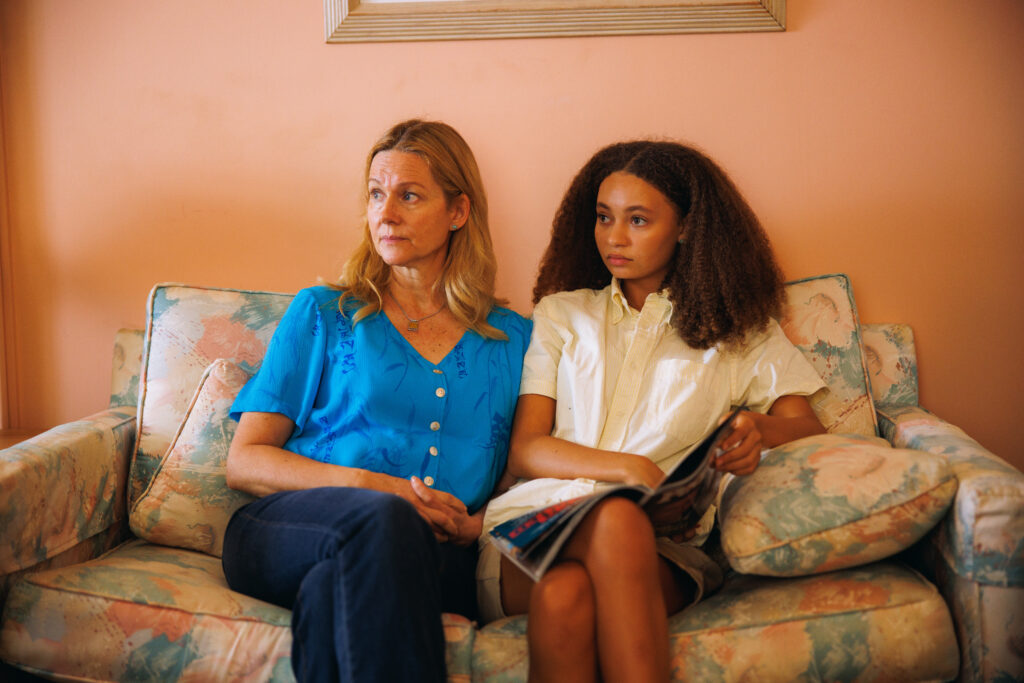
Did Nico have any specific questions for you as she was trying to shape Doris?
Oh my God, so many. And I remember when we rehearsed with her and Laura for a few days before we started shooting, Laura has had significant loss in her life. And so Laura and I both were just talking about that to Nico. You know, what is it like; Nico would ask so many questions about that, about loss and what does it feel like and what is it like when you’re in the room when someone dies, and what is it like when you’re not in the room? And what does a person look like when they die? And what do the nurses do? She just asked so many questions and was sort of cataloging all of these experiences, and then she applied them to her performance in a way that is eerie. [Laughs.] Like, how do you know how to do that?
I wanted to touch on casting briefly because Nico Parker, Laura Linney, and Woody Harrelson are all incredible in this film. What made these actors the right choice to help tell this story?
I mean, they’re the dream cast, right? It really was. With Woody, it was just the ideal person that you would believe lives in Florida like you believe all of everything that is Paul. Like, you believe it so much coming from Woody, ’cause Woody has such a grounded, like every man vibe to him. And he’s so funny, and he is so undeniably lovable. And I really wanted the audience to come away from the movie, kind of loving everyone and empathizing with everyone. I think that’s what Laura has. I think that’s what Woody has. Nico’s like a human angel. In looking at casting, it was really the conversations where, like, who are those people that are so undeniably good and likable that no matter how harsh Kristine’s being, no matter how selfish Doris is being, no matter what you believe about what Paul is protesting, you still at the end of the day are seeing their humanity shine through their eyes. And you’re able to relate and have empathy for them. I think all these actors bring that.
Absolutely. Having a character like Paul in the movie gives Doris that sounding board and a little more perspective. And even when she’s upset, and she’s pushing him and what he’s saying away, we later see that she is, in fact, kind of internalizing his words as she starts reflecting back on her time with her brother. Why was it important for you to have this other adult in the film for Doris?
You know, I had a mentor when I was in my early twenties. He’s still my mentor. He was 20 years older than me, a male writer, and just so kind and gave me so much guidance, in sort of a just altruistic way, right? Just like a giving human being. So, it stemmed from that relationship and how meaningful it was to me. ‘Cause I grew up, you know, I didn’t have a dad in my home. My dad lived in a different state. And I think there are good men in the world and these people that kind of step in and take on these roles, whether it’s a stepdad or an uncle or a neighbor or whatever, like, I do think there are still good decent men in the world.
And so I wanted to pay homage to that. And I also felt like she really needed guidance that wasn’t gonna come from her mother and it wasn’t gonna come from girls her own age. I think in order for this hero to go on this journey, she needs guidance. And I had so many different conversations with the protestors when I was there when I was 18. Along the lines of protestors saying, “What are you doing in there?” “My brother’s in there; he’s passing away,” and them saying, “Oh, we’ll pray for him to recover.” And me being like, “Please don’t do that.” You know? Because my brother was so, so sick. And so at the end of his life, and for me, it was like, this is a boy who was athletic and could see and hear and walk and all the things, and now he can’t see, can’t walk, can’t hear, you know, can’t think, can’t eat for himself, I was like, it’s time for him to go.
So that perspective, too, was just something that I found interesting that these people that were protesting [the Terri Schiavo] case, they have points to make, and they have feelings and they have a reason for being there. And I wanted to get that out. And then Doris has her own feelings and her own sort of ideas about the whole thing. It really just stemmed from wanting to express all of that and finding this one character to do it.
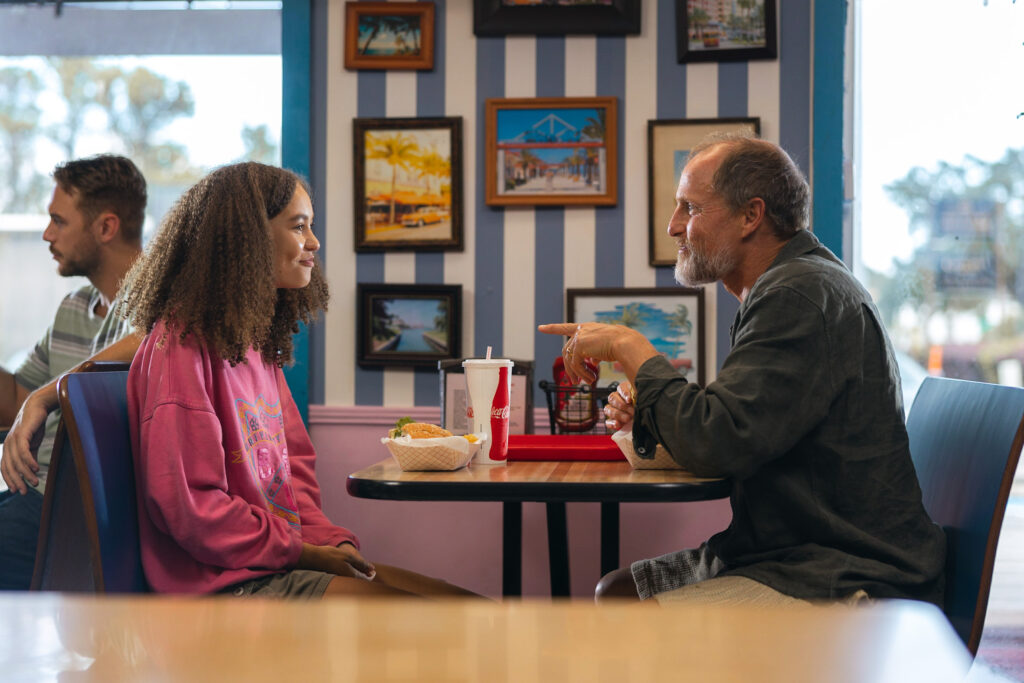
The one thing that Doris tells both Paul and her mom is that she really wants to drive. At that point, when this was happening for you, was there something that you absolutely wanted to do?
Drive. [Laughs.] Yeah. I mean, it’s funny that came from real, but I was driving then, right? ‘Cause I was 18, Doris is 17, but I was 18 when my brother was in hospice. And so I was much older. [Laughs.] I remember being five years old in elementary school, looking out the fence of the school and a car driving by and just being like, “Oh my God.” I had always wanted to drive my whole life. This idea of freedom was something that was so enticing to me from such a young age. I infused Doris with that ’cause that was really it. At that age, it was like, I want to get out of Florida. I want to go to L.A. I want to start a career, which is sort of symbolic of driving, too. But I just wanted to move forward and be free, you know?
Absolutely. And I have to say, I laughed so hard when Doris gets in the car and then asks which one’s the go and the stop. When I was like 16, 17, and my dad put me behind the wheel for the first time, I said, “Okay, just remind me, which one’s the gas and which one’s the brake?”
[Laughs.]
And he said, “Get out.” That was the end. So that scene made me laugh so hard. I was like, “Oh my gosh, that was my experience on the money.”
The same thing happened to me. I was like 15, and all my friends are driving, and a friend of mine was like, “Do you want to drive?” And I’m like, “Sure.” And I get in, and I’m like, “Which pedal is go and which pedal is stop?” And she was like, “Get out of the car.” [Laughs.] I’m glad we had that same experience.
I know you’ve previously worked in television, but being that this is your first feature, what was something that you’ll take from the experience and apply to future film projects?
Oh my God, everything. I learned so much on this movie. I’ve grown like another brain since I started this process. I took classes at Sundance Online two years ago when we first were looking at me directing this movie—no, three years ago, I started taking classes. I started shadowing directors. Even though I had run a show and I had done a lot of overseeing production and show running, I hadn’t specifically directed anything. So, I learned so much about cinematography and all of that aspect of it. So going forward, I think directing is something that I just absolutely loved doing, that was very intimidating to me before this, and that I really want to do more of.
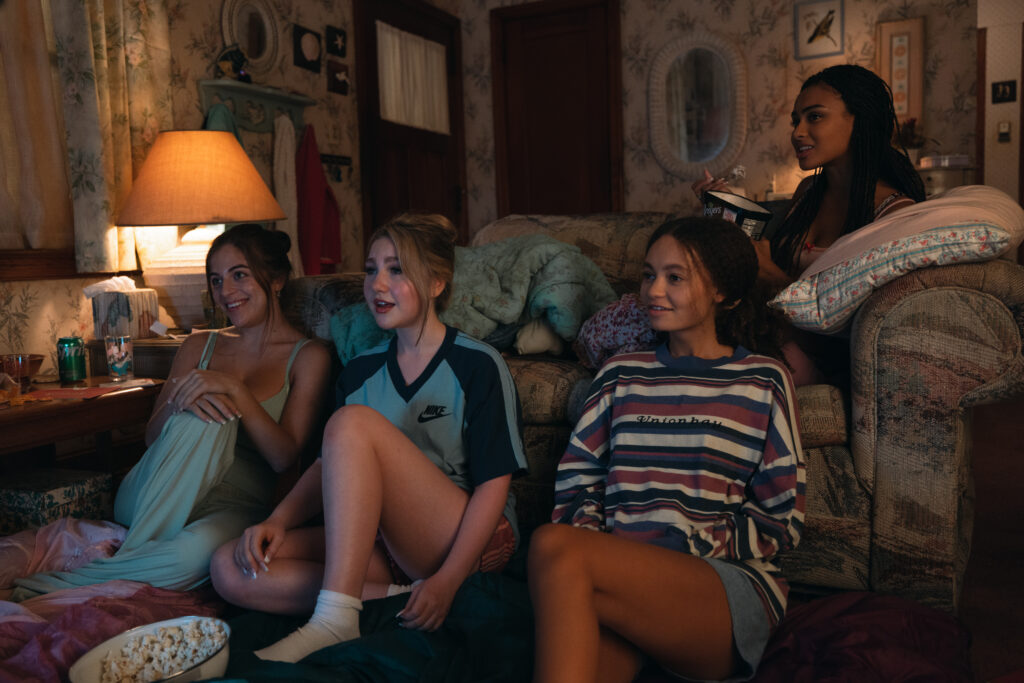
I had read about how you’d done the classes, and you made flashcards to better yourself with the terminology and talking with your cinematographer. At the Academy, there are various tracks of study, including acting, directing, and writing. What advice or words of wisdom do you have for students as far as what they should continue to do to better themselves even after they leave school? It seems so important to keep learning.
Yeah, yeah. Keep learning. That would be my advice, really. It’s just like be humble and know that it’s okay not to know everything. And keep learning. I remember when I was shadowing directors in 2021, they were just like, “What are you doing here?” [Laughs.] They were like, “You ran a show; you’ve been producing television for a decade. Why are you shadowing me right now?” Because when you’re producing TV, you sit next to the director on set. I’ve spent easily 10,000 hours sitting next to a director on set or as an actor on the other side. But still, I was like, “No, there are holes in my understanding of this.” I want to be able to speak to a gaffer. I want to be able to understand what everyone’s job is.
And so even though it seemed like, “Oh, I must already know what I’m doing,” I had so much left to learn, and I still have so much left to learn. And I still want to shadow. I was shadowing comedy directors; I want to shadow drama … I think it’s just that—just keep learning, keep reading things. I still write, I still read screenwriting books. I’m reading a screenwriting book right now. I read screenwriting books all the time. I watch YouTube videos of USC professors, ’cause there’s so much to learn. This is a massive subject; it is a massive medium. This artistic medium is endlessly big, and there’s so much that you can know and so many ways to better yourself. So keep doing it.
Wrapping up, with the film being released on Hulu this Friday, what are you hoping that audiences ultimately take away from this story?
I hope it’s a chance for them to sort of look at a lighthearted movie about grief. It’s a chance to kind of laugh at these moments that are so hard. It’s a chance to cry and emote about these moments that are so hard. And at the end of the day, I really just wanted to show human beings grieving in all the ways that we grieve. And maybe people can relate and it brings catharsis and opens up a conversation about death. And that all forms of grief are okay and that a lot of human beings are really good. And we’re all doing the best we can.
This interview has been edited for length and clarity.
“Suncoast” is now streaming on Hulu.
